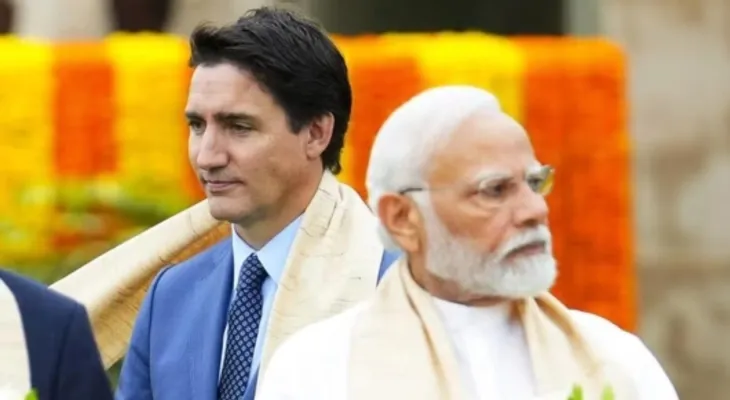Search here
Newspaper
Search here

Arab Canada News
News

Published: October 16, 2024
The diplomatic rift that has led to a deterioration in bilateral relations between India and Canada for over a year has escalated, with both countries expelling each other's senior diplomats due to the killing of a Sikh activist in Canada and allegations of other crimes.
Experts say the diplomatic standoff will make it difficult for the two countries to move forward with a partnership that was once promising and could impact India's ambitions as it seeks to present itself as a rising global power.
India is demanding Canada to recall 41 diplomats amid diplomatic tensions over the killing of a Sikh leader.
Praveen Donthy, a senior analyst at the International Crisis Group, stated, "The bilateral relations between India and Canada, which have been declining since last year, will suffer another blow that will take a long time to repair."
The mutual expulsions came on Monday after Canada informed India on Sunday that its top diplomat in the country is involved in the assassination of Sikh activist Hardeep Singh Nijjar in 2023, and that police had uncovered evidence of an extensive campaign against Canadian citizens by Indian government agents.
Canadian Foreign Minister Mélanie Joly also linked five other expelled Indian officials to the assassination of Nijjar, stating that Canada had gathered "ample, clear, and concrete evidence identifying six individuals as persons of interest in the Nijjar case."
The Indian Ministry of External Affairs rejected these allegations as absurd, announcing it would expel the acting high commissioner of Canada and five other diplomats in response.
New Delhi’s concerns regarding Sikh separatist groups have long strained its relationship with Canada, where Sikhs make up about 2% of the population. India increasingly accuses Justin Trudeau's government of unleashing Sikh separatists from a once-powerful movement seeking to create an independent homeland for Sikhs known as Khalistan.
Nijjar was a local leader of the banned Khalistan movement in India. India designated him a terrorist in 2020 and had been seeking his arrest at the time of his death for his alleged involvement in an attack on a Hindu priest in India.
Canadian police stated that Nijjar was shot dead while leaving the parking lot of the Sikh temple where he served as president in British Columbia on June 18, 2023. He sustained multiple gunshot wounds and died at the scene.
In its statement on Monday, the Indian Ministry of External Affairs attributed Canada’s allegations to "the political agenda of the Trudeau government." The Canadian leader is facing national elections next year.
Michael Kugelman of the Wilson Center, a U.S. think tank, noted that India's strong reaction can be partly explained by how Canada publicly leveled its accusations.
"New Delhi is extremely sensitive to any external criticism of its policies. However, Canada is not just criticizing Indian policies. Its government, at the highest levels, is publicly expressing some of the most serious allegations that another government could make," he said.
Last year, in response to similar allegations made by Trudeau, India requested that Canada remove 41 of its 62 diplomats in the country.
Kugelman stated that the relationship is "on life support at the moment" and that India’s concerns over the Khalistan movement in Canada "essentially hold the relationship hostage."
Canada is not the only country to accuse Indian officials of plotting activities on foreign soil.
Last year, U.S. prosecutors stated that an Indian government official orchestrated a failed assassination plot against another Sikh separatist leader in New York. The official was not charged or named but was described as a "senior field officer" responsible for security and intelligence operations.
New Delhi expressed its concerns at that time after the U.S. raised the issue, stating that India takes it seriously. On Monday, the U.S. State Department stated that an Indian investigative team formed to look into the plot will travel to Washington on Tuesday as part of its ongoing investigations.
The Canadian Foreign Minister indicated on Monday that India is cooperating with U.S. officials but has refused to cooperate in the Canadian investigation.
Donthy remarked that India's diplomatic stance against Canada has been more aggressive due to the relatively low stakes involved.
Donthy said, "U.S.-India relations also have a larger geopolitical framework and context, unlike India's relations with Canada," adding that India's strong reaction was also aimed at sending a message to Prime Minister Narendra Modi's supporters at home.
He added, "Any public criticism is anathema to the Indian government, which represents Modi. This aggressive reaction is aimed at the international community and, more importantly, Modi's domestic audience."
However, experts say the confrontation could have implications for Modi's global ambitions as he seeks to portray India as a rising global power and cultivate closer ties with the U.S., which, like India, is increasingly concerned about China’s growing aggression.
Donthy noted that the escalating dispute between India and Canada "will also affect the growing strategic understanding between the U.S. and Western democracies" that court New Delhi as a counterbalance to Beijing.
Donthy commented that "the Canadian allegations against India are contrary to the tide, given that New Delhi has a favorable external environment." "This will hinder India's aspirations as a great power."
Comments